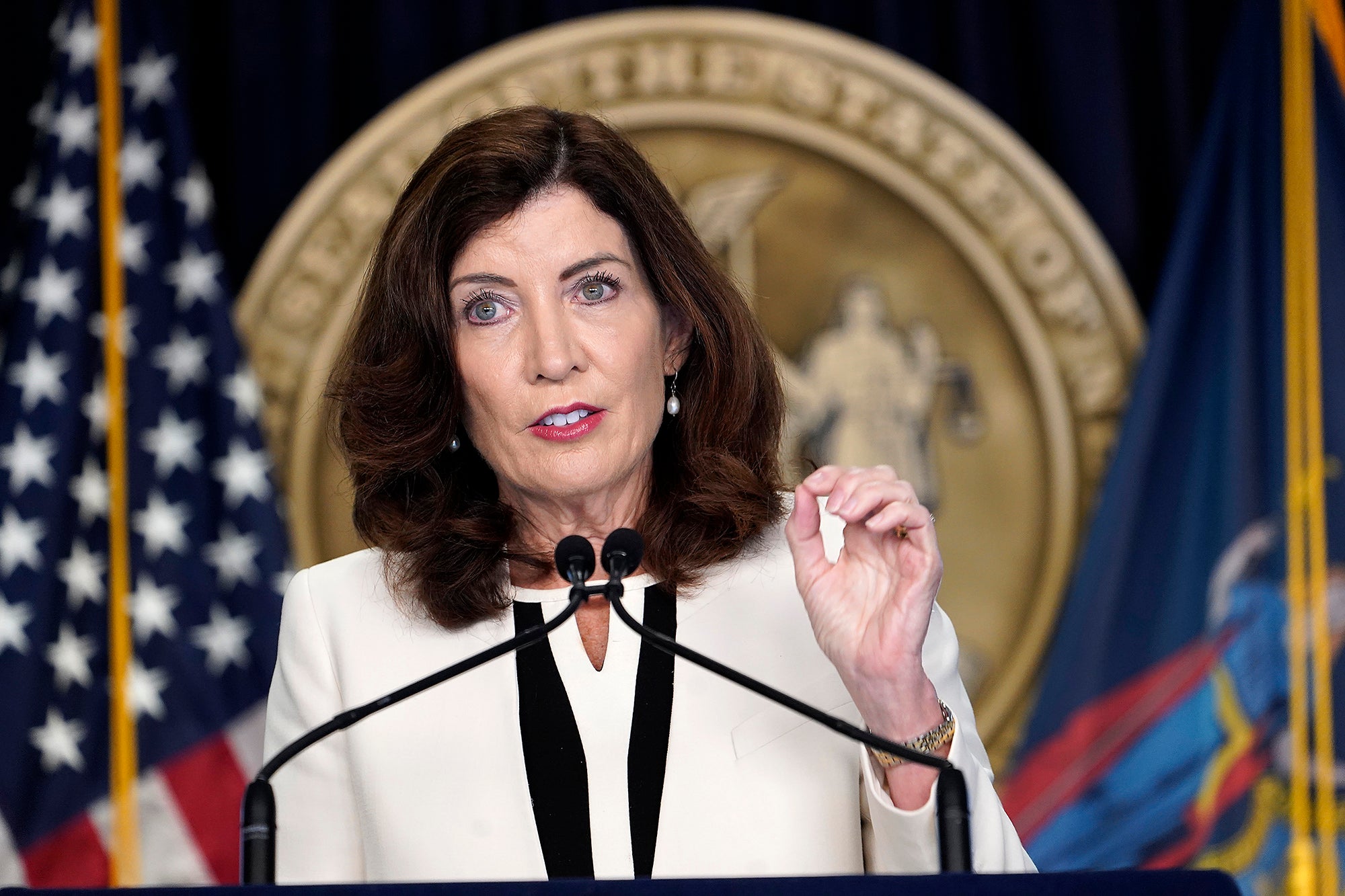Tens of thousands demanded climate action in NYC during Climate Week. Here’s how Governor Kathy Hochul can lead.
The governor should deliver on three key actions to transition New York State off of fossil fuels
Last week was Climate Week in NYC, and tens of thousands of people marched through the streets of midtown Manhattan demanding climate action. The demonstrations came off the tails of New York’s hot, expensive climate crisis summer marked by smoke-filled skies and dangerous air quality, unprecedented flooding that left people stranded, and record-breaking heat waves. To top it all off, while New Yorkers were suffering through this, the Public Service Commission (PSC) granted approval to hike up many New Yorkers’ already unaffordable energy bills.
Thankfully, there are plenty of concrete actions that Governor Kathy Hochul can take to make New Yorkers’ lives easier by saving them money, creating good jobs, and making their communities healthier, all while addressing the climate crisis.
New York State Budget
The upcoming SFY2024-25 New York State budget offers ripe opportunities for Governor Hochul to show she values her constituents’ health and well-being. There are two policies in particular that would signal her dedication to improving the climate and the lives of New Yorkers if included in the budget:
- The NY HEAT Act:In order to mitigate climate change, New York must reduce its reliance on fossil fuels. Gas-fueled buildings should be the first place to start, as they are the single largest source of carbon emissions in New York State. The NY HEAT Act (S2016A) would ensure that the transition away from fossil-fueled buildings is swift and affordable by preventing gas companies from raising customers’ rates to cover the cost of expanding their polluting and outdated system. Moreover, the bill would make it so no New Yorker pays over 6% of their household income on energy costs. These provisions together would save New York families nearly $1,000 per year, putting money back in people’s pockets to cover food, rent, savings and other basic needs as we face a cost of living crisis.
- Green Transit, Green JobsGreen Transit, Green Jobs (S.6089 / A.6414) would tackle another massive source of greenhouse gas emissions in New York State — transportation. Transit buses are one of the vehicle classes most primed for electrification because they run on shorter, fixed routes, making charging infrastructure far easier to build out. However, currently 99% of buses on the road run on fossil fuels, which can travel deep into the lungs to aggravate asthma and increase one’s risk of lung cancer, miscarriages, heart attacks, and premature death. Making matters worse, transit buses are pound-for-pound the most health-harming vehicle class, and they travel hundreds of millions of miles each year. Implementing Green Transit, Green Jobs would substantially cut diesel pollution and clean up the air in New York state by requiring that all new buses purchased by New York public transit authorities are electric by 2029. Further, this bill couples the electrification mandate with a series of provisions that will create tens of thousands of jobs with good wages, benefits, and opportunities for growth — rebuilding a sector that has faced record decline in recent years.
Public Service Commission Nominations
Outside of the executive budget, Governor Hochul has an opportunity to prove herself as an environmental leader by nominating climate champions to the Public Service Commission (PSC), which is the government agency that regulates utilities in New York. By February 1st, the governor has the opportunity to appoint three new commissioners — and the decisions she makes will have an outsized impact on New York’s ability to move away from the expensive gas system and meet the state’s climate law mandates. Recall that this summer the PSC allowed gas giant Con Edison to raise customer’s gas rates by 8.4%, taking $3.9 billion out of New Yorkers’ pockets to expand and maintain toxic fracked-gas infrastructure. This decision, as just one example of many, runs counter to what is needed to meet the mandates prescribed in The Climate Leadership and Community Protection Act (CLCPA) — namely, moving off the gas system as swiftly as possible. By moving off the gas system, customers’s bills will be more affordable while also reducing climate pollution.
We cannot have this kind of discord between a regulating body and our climate law. While the PSC may seem like a separate entity from the governor’s office, the reality is that Governor Hochul controls who is on the commission. She can nominate individuals who have a history of protecting consumers while taking meaningful climate action, or individuals who will stick to the status quo and continue to favor gas companies over New York families.
Governor Hochul and her agencies have taken some important steps to protect our climate, to be sure — like adopting a law calling for all-electric new construction starting in 2026, passing a $4 billion environmental bond act, and denying air permits for polluting fossil fuel power plants. The summer New Yorkers just experienced demonstrates exactly why we need to move at breakneck pace to ensure we meet the mandates set out by the CLCPA, and to provide a model for the rest of the nation and the world. When New York acts on climate, others follow. It is Governor Hochul’s responsibility to take the lead and deliver a cleaner, fairer future to all.
Established in 2008, Earthjustice’s Northeast Office, located in New York City, is at the forefront of issues at the intersection of energy, environmental health, and social justice.
Zoe Woodcraft
Public Affairs and Communications Officer, Earthjustice
zwoodcraft@earthjustice.org
